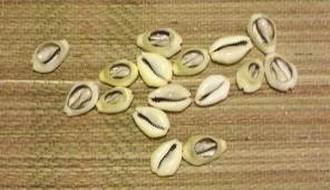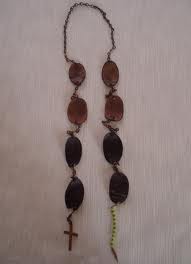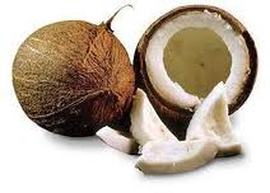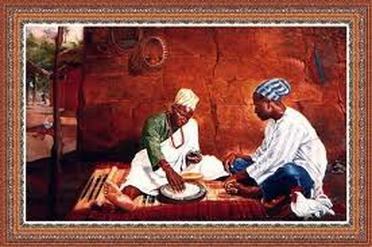Divination Practices in Santería
Divination is an essential part of Santería because it's how human beings receive advice and guidance from the Orichas and the Egún (spirits of the ancestors). Only Olorichas (fully initiated priests and priestesses of Santería) or Babalawos (priests of Orula) can do divination, because it requires the use of divination tools that have been properly consecrated. Divination is not like fortune telling. It's a sacred ritual. The Oloricha or Babalawo interprets what the Orichas have to say, but interpretation requires intensive training and follows very specific procedures. Not everyone has the aché (spiritual energy) for divination, and everyone is interested in learning how to do it. In any given religious community, only a few people might have the calling to become specialists in divination. Others may be familiar with the process, but not masters of interpretation.
Divination with the Dilogún

Dilogún (cowrie shells)
Dilogún/ Diloggún are consecrated cowrie shells used by an Oloricha to carry out a divination ritual with the Orichas. In Cuba, this ritual is called a consulta (consultation)or a registro (check up). Anyone can get a consulta for any reason, although most of the time the person asking for the consulta will already have some knowledge of Santería practices and be familiar with the procedure. Typically, a person who's experiencing some kind of a problem or who feels anxiety or uncertainty about a situation will ask for a consulta to get guidance and help. A consulta will reveal if the client has iré (blessings) or osorbo (obstacles) in his life at the present time. If there is osorbo, the consulta will determine where it comes from and what causes it, and offer some remedies for how to remove it. If there's iré, the client will learn what to do to make sure the blessings continue. A consulta can touch on many aspects of a person's life, including physical, mental and emotional health, money, work, success, family, friends, marriage, fertility, personal safety, travel, legal issues, or problems with the law, as well as issue warnings about envy, jealousy, greed, insincerity, or betrayal that might impact negatively on the client's life. It combines practical advice mixed in with metaphysical and spiritual teachings, to help the client bring his life back into harmony and live the life he was meant to have. If the client follows the advice given, the Orichas will work on his behalf to help him progress. But, if the client doesn't follow through on promises made to the Orichas, the situation will get worse. For most general purposes, the diviner will use 16 shells belonging to Eleguá. Eleguá opens the doors to communication with all the other Orichas and the Egún. During a reading, any of the Orichas might "stand up" to talk through Eleguá's shells.
Babalawos and Ifá

An epuele used by Babalawos
In Afro-Cuban culture, the Regla de Ocha and the Regla de Ifá are two closely related religious systems, both with roots in West Africa. Only heterosexual males can be initiated into Regla de Ifá. Once fully initiated, they're known as Babalawos, or the priests of Orula. Those who are called into Ifá don't necessarily have to be initiated first in Ocha. Many Babalawos go directly into Ifá, skipping Ocha altogether. Women can receive cofá de Orula (also called Ikofá) and males, gay or straight, can receive mano de Orula. These ceremonies put people under the protection of Orula, who makes sure they don't die before their appointed time. Not everyone needs cofá or mano de Orula but, if it is needed, that information will come out during a consulta with a Babalawo. Anyone can get a consulta with a Babalawo for any reason, whether initiated in the religion or not. Using the epuele chain (also known as ekuele), the Babalawo casts patterns that determine which odu (sign or letter) falls and in which orientation. Similar to a consulta done with dilogún, the epuele patterns indicate if the reading comes in iré or osorbo, and what needs to be done to remedy the problem. Babalawos work with 256 odus, which makes the divination process very complex and thorough.
It's a misconception that Babalawos are the "high priests" of Santería. They're not. Ifá and Ocha are two parallel systems, each with its own characteristics, powers, and limits. Neither system is inherently superior to the other. Both Olorichas and Babalawos can be very skilled in divination. However, only Babalawos can work directly with Orula and, in the Oricha world, Orula is the master diviner. Orula possesses all the secrets in the world, so he can guide people toward their destinies and influence their future. He oversees births and deaths and knows when is our correct moment to die. A skilled Babalawo can channel Orula's knowledge through the epuele. Babalawos aren't allowed to use the dilogún for divination purposes, but some Ocha houses work closely with Babalawos and will involve them in interpretation when certain odu appear in dilogún readings. It's a personal choice whether one prefers to see a Babalawo or an Oloricha for a consulta. To some extent, it depends on the level of confidence the client has in the diviner's aché.
It's a misconception that Babalawos are the "high priests" of Santería. They're not. Ifá and Ocha are two parallel systems, each with its own characteristics, powers, and limits. Neither system is inherently superior to the other. Both Olorichas and Babalawos can be very skilled in divination. However, only Babalawos can work directly with Orula and, in the Oricha world, Orula is the master diviner. Orula possesses all the secrets in the world, so he can guide people toward their destinies and influence their future. He oversees births and deaths and knows when is our correct moment to die. A skilled Babalawo can channel Orula's knowledge through the epuele. Babalawos aren't allowed to use the dilogún for divination purposes, but some Ocha houses work closely with Babalawos and will involve them in interpretation when certain odu appear in dilogún readings. It's a personal choice whether one prefers to see a Babalawo or an Oloricha for a consulta. To some extent, it depends on the level of confidence the client has in the diviner's aché.
Obi Divination

One of the simplest forms of divination that an Oloricha can do is "dar coco" or consult with pieces of coconut. In Lucumí, coconut is called Obi. Obi is sacred, and must be treated with respect. Traditionally, the Oloricha is required to open a fresh coconut using a machete or a mallet. He must hold it in his hands, not break it on the floor. When the coconut is open, he selects four bits that are equal in size, trimming them if necessary to create manageable shapes. Using prayers and following ritual protocol, the Oloricha throws the pieces of obi to the floor to get answers to yes/no questions. Generally, this kind of ritual is done to find out what tribute the Orichas want, where to put it, and if they're pleased with it once it has been offered.
What to Expect from a Consulta
Consultas should be entered into with serious intent and a commitment to listen to the words of the Orichas. Don't go with the idea that someone is going to tell you what the future holds, or what you should do with your life. The future is in your hands, and with the guidance of the Orichas, you can create the life you want and deserve. A consulta can bring up deep issues that you'll have to sort out, and you may be asked to modify your behavior or change your way of interacting with the world around you. It's not a quick fix, but it will set you on the right path and help you grow. When you show devotion to the Orichas, they protect and bless you so that you can evolve in positive ways.
|

